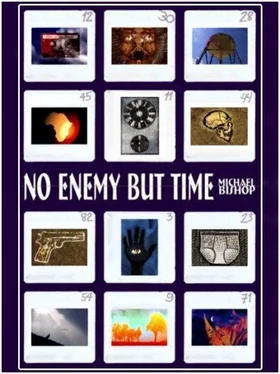Although the rain held off, over Lake Kiboko the lightning show was heating up, and admonitory rumbles made the horizon tremble. Everything was happening northwest of us, out where Zarakal, Ethiopia, and Somalia would one day put their troops in a deranged effort to establish borders where no one had ever observed any.
Helen paid no attention to the noise. She was trying to bear her child, but her body would not cooperate. The baby’s head, which had descended through the uterus as far as it could go unaided, was too big for Helen’s narrow pelvic structure. She was taller than any other female habiline, but her tallness was of the sylphid kind, loose and willowy. Because my endocranial volume outpointed hers by at least seven hundred centimeters, her baby had inherited from me a genetic template for a brain case perilously larger than the habiline norm.
In pain shalt thou bring forth children.
The price for the development of a mind capable of making abstract moral judgments is pain in childbirth, while the penalty for paying the price is expulsion from the Garden. Looking at Helen’s strobe-lit face, I knew that her expulsion would come not at the hands of dutiful cherubim but instead through the cold instrumentality of Death. She was not going to make it. Her eyes trembled in their sockets. Her naked forehead ran with sweat. The flashes of sheet lightning over the distant lake seemed to drain the indigo sheen of health from her face. Her skin was slack and gray.
I went back to our shelter and found my pocketknife. It had proved useful in separating Jomo from his ear, but now it must perform a more urgent task, saving Helen’s life. I gathered together all the dry grass in our hut, carried it outside, and set it afire with one of the last of my matches. Then, as Malcolm gazed down skeptically, I piled brushwood on the fire and sterilized my large pen blade in the unruly flames.
Snatching the knife out again, I blistered my fingers, but the pain was of no consequence, and I ignored it to get back to Helen.
Emily, Dilsey, and Alfie had also entered Guinevere’s semicircular windbreak. Their eyes turned toward me, going almost immediately to the knife. I gestured with it, eased my way inward, and knelt by Helen with a premonition of disaster settling in my belly. My entire body seemed to be held together by gummy resins and tangled strings.
Helen cried out, an inhuman cry of warning and pain. Everyone looked at her, then at me. I raised the knife and told the habilines in clear, calm, rational tones that it might be necessary to make an incision in the outer edge of Helen’s vagina to facilitate delivery. My fear was that this cut, even if I could make it cleanly, would prove an inadequate remedy for her troubles. In fact, I had brought the knife thinking that if she died in labor, I might be able to rescue the infant with a crude Caesarean section.
The clinical clarity of this plan broke down under the weight of Helen’s suffering. The idea of even touching her with the knife sickened me, and I dropped it into the dirt. In deepening perplexity four silent habilines looked on, consoling one another with embraces and absent-minded pats. I do not think that even Dilsey had ever witnessed so taxing a labor.
As the storm drifted southwest from the Horn—sheet lightning giving way to zigzag slashes of almost unendurable brilliance, thunder whip-cracking after every bolt—Helen somehow managed to evict the tiny torturer in her womb. Guinevere, not I, received the child. In the oppressive glow of the storm its body shone neither blue-black nor gray, but a startlingly phosphorescent white.
The baby’s skin was blancmange, the color of milk pudding. How could this unappetizing little grub be the issue of my lovemaking with Helen? The mired hippopotamus that the Minids had eaten had been a lovelier hue, a more comprehensible variety of mutant. I had refused to eat of it for fear of violating the integrity of one of my dreams—but this creature, my daughter, how was I ever going to be able to love her? Her head was too large for her gaunt body; her pallor suggested not merely albinism but illness.
“ Mai mwah,” said Helen feebly from where she lay.
I placed the grub at full length between my wife’s breasts. Helen enfolded the child in her hairy arms, lifting her head to peer downward at the little creature. Her lips parted. “ Mai mwah,” she said again. No one moved. The grub found one of Helen’s breasts and began to suckle: a small ivory incubus drinking the heart’s blood of the woman who had borne her.
Northwest Frontier District, Zarakal
July 1987
Hazyin the harsh light of dawn, emptiness. Once, long ago, this part of Zarakal had been fertile grasslands; today it looked like a petrified sea, broken here and there with combers of thorn scrub, grit kicking up in spray at the unpredictable bidding of the wind. A lone hyena stood on the salt flat watching a caravan of three vehicles moving northwestward along the highway connecting Russell-Tharaka Air Force Base in the country’s heartland with the Lake Kiboko Protectorate in the Great Rift Valley. The highway had been built over the past two years with American money, machinery, and supervision, although the Zarakali Minister of Interior, Alistair Patrick Blair, had insisted on a large management role for himself and a coolie work force of indigenes. One part of the highway linked Marakoi, the capital, with the air base thirty miles northeast, but the remaining three hundred miles of macadam struck many observers, both native and American, as Blair’s private expressway to nowhere. The Great Man had grown weary of replenishing the supplies of his field workers at the Lake Kiboko digs by helicopter or light aircraft. Hence this ribbon of asphalt through the awesome emptiness of the Zarakali desert.
Joshua murmured, “Not a used-car dealership in sight.”
“Our military still hasn’t been here all that long,” replied Woody Kaprow, who was driving the second vehicle in the caravan. “Give it time, Joshua. Give it time.”
“God forbid there should ever be that much time.”
Alistair Patrick Blair, riding between Kaprow and Joshua in the cab of the big vehicle, laughed. “God and Woody Kaprow, physicist supreme. They jointly hold the patent on all temporal properties.”
“Not so,” Kaprow replied. “Not so.”
Ahead of them, the lead vehicle in their caravan, cruised a Land Rover that had been modified to accommodate not only a swivel-mounted machine gun but also a hundred-gallon drum of drinking water.
An American air policeman was driving this escort, a uniformed Zarakali security agent riding shotgun.
Behind Joshua, Blair, and Kaprow, the caravan’s caboose was a huge truck with a covered flatbed pulling a generator more suggestive of a collapsible camper than a caisson. Both the Land Rover and the truck were a dusty olive-drab, chevroned with the doubtful camouflage of zebra striping.
Of the three vehicles in the caravan, the one in which Joshua and his companions rode had the strangest design and the most mysterious purpose. Half again as long as the truck, it resembled an Airstream trailer coated with a layer of protective plastic; its most aerodynamic-looking hull was as sleek as the skin of a porpoise, while its cab protruded like the nose of an immense electric iron with a wraparound windshield set into it. Six monstrous tires bore the weight of this vehicle, which Kaprow had recently taken to calling, with subtle bravado, The Machine. Only a month before this expedition to Lake Kiboko, it had arrived in Bravanumbi, Zarakal’s principal port city, aboard an American aircraft carrier; and Kaprow, who had accompanied it on that voyage, would let no one else drive it. Blair had offered to spell him at the wheel during their night-long trip from the air base, but Kaprow had firmly declined the offer. Although its development had been funded with U.S. tax monies, he regarded The Machine—if not Time itself—as his personal property.
Читать дальше



![Ally Carter - [Gallagher Girls 01] I'd Tell You I Love You But Then I'd Have to Kill You](/books/262179/ally-carter-gallagher-girls-01-i-d-tell-you-i-lo-thumb.webp)








